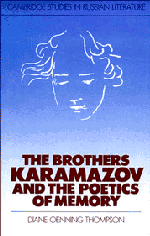Book contents
- Frontmatter
- Contents
- Preface
- Note on the text
- 1 Memory and poetics
- 2 The fictional narrator
- 3 Memory and the system of ascending plots
- 4 The memories of the characters: forms of affirmative memory
- 5 The memories of the characters: forms of negative memory
- 6 Forgetting
- 7 Foretelling
- 8 The Christocentric poetic memory system
- 9 Afterword
- Notes
- Bibliography
- Index
- Titles in the series
1 - Memory and poetics
Published online by Cambridge University Press: 05 November 2011
- Frontmatter
- Contents
- Preface
- Note on the text
- 1 Memory and poetics
- 2 The fictional narrator
- 3 Memory and the system of ascending plots
- 4 The memories of the characters: forms of affirmative memory
- 5 The memories of the characters: forms of negative memory
- 6 Forgetting
- 7 Foretelling
- 8 The Christocentric poetic memory system
- 9 Afterword
- Notes
- Bibliography
- Index
- Titles in the series
Summary
Mnemosyne is Eternal Memory. Here is another name for that continuity of communion in spirit and force between the living and the departed.
Vyacheslav Ivanov, By the StarsOne may well wonder what memory has to do with The Brothers Karamazov, a novel whose story covers little more than two months, more, whose narrated time is mainly compressed into a mere six days. Yet, the interplay between cultural memory and the individual memories of the author and reader, narrator and characters has been so fully, subtly and variously developed that it can be seen as a dominant means of organising this novel's artistic system, structurally, aesthetically and semantically. For The Brothers Karamazov abounds in symbolic imagery, generic styles and images of people engaging in many strange conversations on manifold topics, each of which has its own words laden with the semantic, contextual and stylistic accretion of centuries. The Russian scholar, Leonid Grossman, traced Dostoevsky's generic roots to the ‘sacred drama of the Eleusinian mysteries’. Bakhtin also found that they ‘go back to deep antiquity’, to ‘the very sources of European literature’. The whole novel constitutes a great eschatological dialogue in which, as Bakhtin put it, the questions of Dostoevsky's characters ‘sound before earth and heaven’. And in the composition of their sounds mingle all the muses in Dostoevsky's ‘polyphonic’ universe; the muses of history, comedy, tragedy, music, astronomy and even dancing.
- Type
- Chapter
- Information
- The Brothers Karamazov and the Poetics of Memory , pp. 1 - 25Publisher: Cambridge University PressPrint publication year: 1991
- 1
- Cited by



